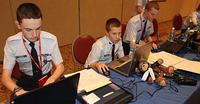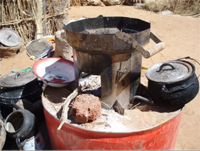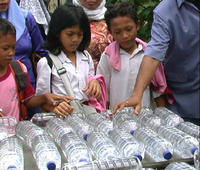-
Raytheon expanding its commitment to math and science education
Raytheon Company said it is expanding its commitment to math and science education through a $1 million gift that will help extend the national impact of the Museum of Science, Boston’s Engineering is Elementary (EiE) program; in the past five years, Raytheon has committed more than $60 million to MathMovesU, STEM and education programs
-
-
Environmentalists in arms over border decision
Yesterday, House Natural Resources Committee 26-17 vote to approve H.R. 1505, the National Security and Federal Lands Protection Act; the proposed legislation would waive thirty-six environmental and other laws for U.S. Customs and Border Patrol activities on public lands within 100 miles of U.S. borders; environmentalists are angry
-
-
Food safety grant to fund research on preventing food-borne illnesses

A $1.3 million grant to develop a new food-safety training program for government and industry has been awarded by the U.S. Food and Drug Administration (FDA) to the University of California, Davis, School of Veterinary Medicine
-
-
CSC wins $86 million task order for emergency communications
On Wednesday CSC announced that it had won an $86 million task order from DHS to continue providing emergency priority telecommunication services for the agency
-
-
Electronegativity will simplify chemistry education, allows new research
Researchers at Oregon State University have created a new, unifying method to describe a basic chemical concept called “electronegativity,” first described almost eighty years ago by OSU alumnus Linus Pauling and part of the work that led to his receiving the Nobel Prize
-
-
Registration for CyberPatriot IV competition to end this week

With less than a week left before registration closes, CyberPatriot IV, the National High School Cyber Defense Competition, has more than 850 teams registered; this competition is attracting high school educators across the United States; the structure of the competition provides students hands-on learning while competing virtually against their peers and introduces many to the idea of cyber security as a profession
-
-
Teaching sensors to think for themselves
There is a major problem with sensors: data overload; as sensors gather more and more information, it has become increasingly difficult for human users to separate out what is relevant from what is not; two U Vermont researchers received a grant from DARPA to teach sensors what to look for — and what not to look for
-
-
Defying governor, Mass. officials seek to join Secure Communities

Local law enforcement officials and state lawmakers are increasingly working to circumvent Massachusetts governor Deval Patrick’s decision to opt out of the controversial Secure Communities immigration program; last Wednesday U.S Senator Scott Brown (R-Massachusetts) called on DHS secretary Janet Napolitano to allow the state to join Secure Communities without Governor Patrick’s approval; Under Secure Communities, a detained individual’s fingerprints are automatically scanned and checked against DHS and FBI databases to determine their immigration status
-
-
Safe, efficient cookstoves for earthquake survivors

316,000 people were killed and more than one million made homeless by the 12 January 2010 magnitude 7.0 quake that left the capital city of Port-au-Prince in ruins; many of the displaced Haitians still live in tent cities, where even simple tasks such as cooking are a challenge; scientists hope to find the safest and most energy-efficient way for earthquake survivors to cook
-
-
Self-repairing composites repair cracks in coating of buildings, bridges
Researchers have developed vascularized structural composites, creating materials that are lightweight and strong with potential for self-healing, self-cooling, metamaterials, and more; these artificial microvascular systems can self-repair of materials damage, such as cracks in a coating applied to a building or bridge
-
-
Solar UV disinfects drinking water

More than 800 million people around the world lack access to clean water; the water available for people to drink in many developing countries has not been treated to remove contaminants, including pathogenic microorganisms; half of the world’s hospital beds are occupied by people who are sickened by the water they drink; Purdue University researchers have invented a water-disinfection system that uses the sun’s ultraviolet radiation to inactivate waterborne pathogens
-
-
Protecting structures against firebrand attack
NIST engineers have built a device that bellows showers of glowing embers, or firebrands, to test how structures can withstand this destructive aspects of wild fires; in Japan, where the device is now used in a test facility, firebrands are a growing peril that accounts for half of the nation’s ten most costly fires
-
-
Belief that others can change could bring peace
Psychologists find that members of groups engaged in conflict are more willing to compromise if they believe people are capable of changing; when researchers presented Israelis and Palestinians with evidence that groups of people are capable of change, the information increased the subjects’ willingness to compromise on key political issues
-
-
E-textiles now come with memory-storing fiber
E-textiles could help soldiers, first responders — but also the sick and infirm; the integration of electronics into textiles is a growing field of research that may soon enable smart fabrics and wearable electronics
-
-
Georgia shows app that prepares state residents, guides them to safety
New Ready Georgia mobile app uses geo-location to deliver alerts, create emergency plans, and show shelter locations; from up-to-the-minute weather and hazard alerts based on a user’
‘s location, to customizable emergency preparedness checklists, the app combines a set of features not previously available in one mobile application -
More headlines
The long view
Encryption Breakthrough Lays Groundwork for Privacy-Preserving AI Models
In an era where data privacy concerns loom large, a new approach in artificial intelligence (AI) could reshape how sensitive information is processed. New AI framework enables secure neural network computation without sacrificing accuracy.
AI-Controlled Fighter Jets May Be Closer Than We Think — and Would Change the Face of Warfare
Could we be on the verge of an era where fighter jets take flight without pilots – and are controlled by artificial intelligence (AI)? US R Adm Michael Donnelly recently said that an upcoming combat jet could be the navy’s last one with a pilot in the cockpit.
The Potential Impact of Seabed Mining on Critical Mineral Supply Chains and Global Geopolitics
The potential emergence of a seabed mining industry has important ramifications for the diversification of critical mineral supply chains, revenues for developing nations with substantial terrestrial mining sectors, and global geopolitics.
AI and the Future of the U.S. Electric Grid
Despite its age, the U.S. electric grid remains one of the great workhorses of modern life. Whether it can maintain that performance over the next few years may determine how well the U.S. competes in an AI-driven world.
Using Liquid Air for Grid-Scale Energy Storage
New research finds liquid air energy storage could be the lowest-cost option for ensuring a continuous power supply on a future grid dominated by carbon-free but intermittent sources of electricity.
Enhanced Geothermal Systems: A Promising Source of Round-the-Clock Energy
With its capacity to provide 24/7 power, many are warming up to the prospect of geothermal energy. Scientists are currently working to advance human-made reservoirs in Earth’s deep subsurface to stimulate the activity that exists within natural geothermal systems.
